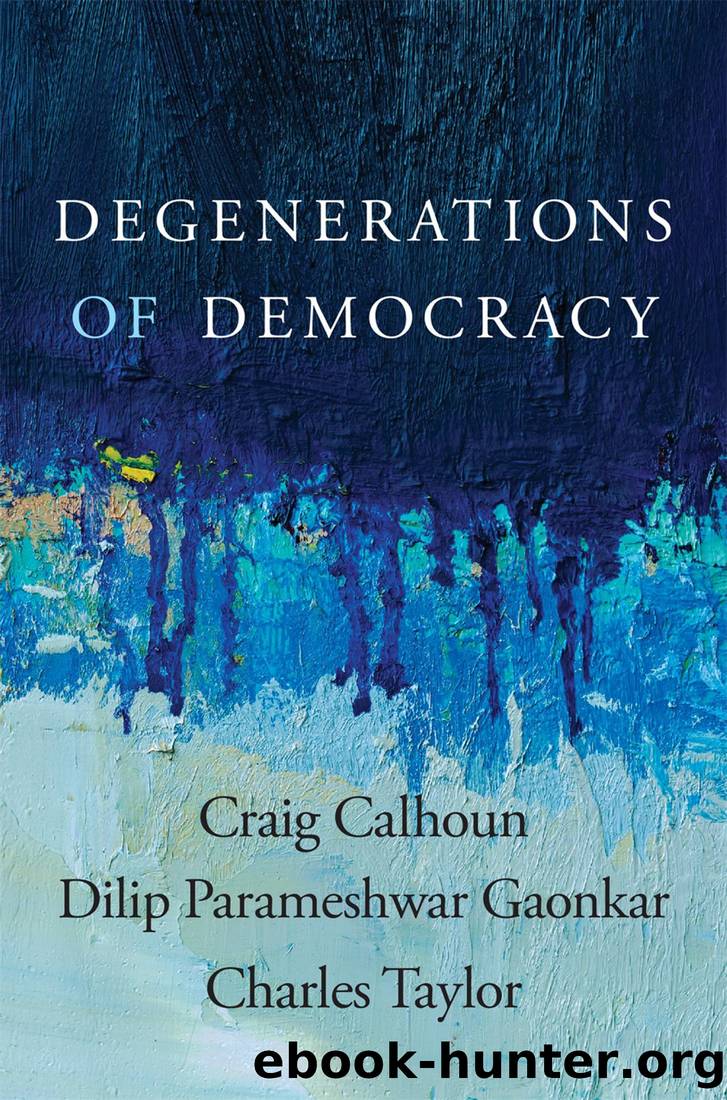Degenerations of Democracy by unknow

Author:unknow
Language: eng
Format: epub
Tags: Philosophy, Political, Political Science, General, Political Ideologies, Democracy, History & Theory, Political Process, Political Parties, Political Freedom
ISBN: 9780674237582
Google: OT1vEAAAQBAJ
Publisher: HarvardUP
Published: 2022-05-17T20:41:45+00:00
Rethinking Direct Action
As indicated earlier, and given the dynamism of capitalism today, âEngelsâs pause,â the hiatus between Karl Polanyiâs two movementsâthe great societal transformation triggered by industrial capitalism and the delayed political response to its derangements and negative externalitiesâkeeps recurring at shorter intervals than when Polanyi recounted them in his 1944 work on The Great Transformation. These pauses strain democracy and call forth a distinctive mode of political response from the nonelites, the governed. That mode of politics may be broadly characterized as âdirect action.â
The expression âdirect actionâ was frequently deployed by Martin Luther King Jr. during the US civil rights movement in the 1960s. In Kingâs political imagination (which owes much to Gandhi), âdirect actionâ implies a particular way of staging âthe peopleâ and refers to a mode of movement-based mobilization that functions as an alternative to exercising political power through elections or through parliament. âDirect actionâ is also regarded as an alternative to the legal route for redressing grievances when the court delays and denies social justice. For King, as well as for Gandhi, âdirect actionâ suggests nonviolence. I will try to offer a different (not necessarily violent) genealogy of âdirect action.â This other genealogy takes the same agents as King and Gandhiâcrowds, riots, and uprisingsâbut looks to the molecular rather than the molar and the local rather than the national to explore direct actionâs scopes, temporalities, and addressees. More than anything else, I want to invite you to rethink âdirect actionâ (in all its ubiquity) in an age of globe-spanning rapid growth, selective abundance, asymmetrical affluence, and deepening inequality.
Since all historically known societies are marked by the unequal distribution of income and wealthâof rank and status as well as of access to resources and opportunitiesâthere is always palpable social conflict and tension between the two broadly constituted but internally heterogeneous groups, the elites and the nonelites. It is also the case that while the nonelites are numerically vastly greater than the elites, the latter invariably control, manage, and steer the polity, economy, and culture. As David Hume perceptively observed in the mid-eighteenth century, such is the case not just under autocracies, but also under popular modes of governance:
Nothing appears more surprising to those who consider human affairs with a philosophical eye than the easiness with which the many are governed by the few and the implicit submission with which men resign their own sentiments and passions to those of their rulers. When we inquire by what means this wonder is effected, we shall find that, as force is always on the side of the governed, the governors have nothing to support them but opinion. It is, therefore, on opinion only that government is founded, and this maxim extends to the most despotic and most military governments as well as to the most free and most popular.23
Download
This site does not store any files on its server. We only index and link to content provided by other sites. Please contact the content providers to delete copyright contents if any and email us, we'll remove relevant links or contents immediately.
| Anarchism | Communism & Socialism |
| Conservatism & Liberalism | Democracy |
| Fascism | Libertarianism |
| Nationalism | Radicalism |
| Utopian |
The Secret History by Donna Tartt(19092)
The Social Justice Warrior Handbook by Lisa De Pasquale(12191)
Thirteen Reasons Why by Jay Asher(8912)
This Is How You Lose Her by Junot Diaz(6889)
Weapons of Math Destruction by Cathy O'Neil(6281)
Zero to One by Peter Thiel(5802)
Beartown by Fredrik Backman(5759)
The Myth of the Strong Leader by Archie Brown(5509)
The Fire Next Time by James Baldwin(5449)
How Democracies Die by Steven Levitsky & Daniel Ziblatt(5219)
Promise Me, Dad by Joe Biden(5154)
Stone's Rules by Roger Stone(5088)
A Higher Loyalty: Truth, Lies, and Leadership by James Comey(4964)
100 Deadly Skills by Clint Emerson(4927)
Rise and Kill First by Ronen Bergman(4790)
Secrecy World by Jake Bernstein(4753)
The David Icke Guide to the Global Conspiracy (and how to end it) by David Icke(4720)
The Farm by Tom Rob Smith(4514)
The Doomsday Machine by Daniel Ellsberg(4490)
